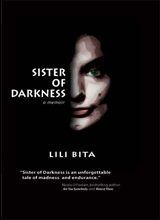Lili Bita – Sister of Darkness. Reviewed by Prof. Ekaterini Georgoudaki
(Dr. Ekaterini Georgoudaki is Professor Emerita in the Department of English at the Aristotle University of Thessaloniki.)
In her memoir, the well-known writer and actress Lili Bita reconstructs her life form the time of her birth on the Greek island of Zakynthos to the time of her escape from an abusive marriage to a Greek man in the USA. Its form is linear and chronological. It has four parts, each one with a different setting: the Island, Athens, Munich, and America. As the narrative moves in time and space, she faces more obstacles to her development, but also has more chances to expand her experiences and develop herself. The emphasis in the memoir is on her personal life and interpersonal relationships, which are presented against the historical background of the times.
While describing her island’s society, including the disruption and destruction of individual, family, and communal life caused by World War II and the Civil War, Bita also has the chance to point out social and political injustices, including women’s oppression. In the patriarchal island society of that period, women were considered inferior to men. Therefore, they occupied a subservient position in their families and in the community, they were confined to the domestic sphere, and they were excluded from the public cone. Their bodies, minds, and lives were under the control of men who had double moral standards. Self-effacement was considered a feminine virtue. Any efforts of women to assert their sexual or intellectual freedom, and any ambitions to call public attention to their artistic or distinctiveness were considered unfeminine and were punished. As Bita shows, even in the more liberal Athens society, where she had some chances to distinguish herself as a concert pianist, an actress, and a writer, the position of women was vulnerable. The standards of artistic achievement were set by men, and the road to fame usually passed through the bedrooms of the men who occupied positions of power.
Bita shared the dream of many post-war Greeks who immigrated to America, because they saw it as the land of freedom and a promise for a better life. Through her affair and later marriage to a Greek man who taught at an American university, Bita hoped to realize this dream. As the events in the memoir show, however, the man was the embodiment of misogyny, and her life with him soon became a nightmare. He confined her in their house, and abused her physically and psychologically in order to break her morale and bring her under his complete control. The only recognition of her talents came from his American colleagues who asked her to play the leading role in a Greek play, despite his objections. This recognition in America, together with her earlier theater studies and acting experience in Greece and with Nikos Kazantzakis’s encouraging comments about her writing ability, foreshadow her gradual development and later success as an actress and writer in America and abroad. The memoir ends
with a reference to the ancient myth of Orpheus and Eurydice. Bita identifies with Eurydice, whom she calls “sister of darkness” and points out that only Orpheus had the “power of choice,” whereas his wife had her path “chalked out.” In Bita’s version of the story, both Eurydice and the memoir’s narrator finally reject their prescribed social role as women to walk behind a man and to see the world and themselves through his eyes. Eurydice and returns to the underworld and the narrator escapes with her two children in the darkness of the night.
Like other women’s autobiographies, Sister of Darkness presents Bita’s life as an example of her own and other women’s struggle to survive and grow in a hostile environment. Self-writing enabled Bita to reveal the oppression she had experienced, and thus to break the silence imposed on women by patriarchy, to exorcise the demons of her past, to subvert degrading stereotypes about women, and to redefine the female self on her own terms. As she states at the end of her memoir: “It is time for us to write our own endings for Eurydice,” they mythical self who “has lived in all women for thousands of years.” Thus, writing appears as a process leading to self-knowledge, self-definition, self-assertion, self-esteem, self-empowerment, and ultimately freedom. In Sister of Darkness, we find the same powerful language that characterizes Bita’s poetry and fiction. Her theater experience also enables her to create several dramatic scenes that keep the reader in suspense. In addition, the vivid descriptions of her birthplace, with its customs and superstitions, and of war events, her social commentary, the portraits of individuals, the lively dialogues, the sensuous images, and other aesthetic elements bring to life the island society and the Athenian environment that shaped her character and goals for life from childhood to adulthood. Sister of Darkness is a fine piece of autobiographical writing that complements Bita’s poetry and fiction and enriches our contemporary feminist literature.

